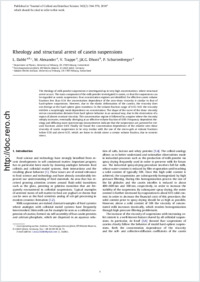Rheology and structural arrest of casein suspensions
- Dahbi, Louisa Department of Physics, University of Fribourg, Switzerland - Forschungszentrum Jülich, IFF/Weiche Materie, Jülich, Germany
- Alexander, M. Department of Physics, University of Fribourg, Switzerland
- Trappe, Véronique Department of Physics, University of Fribourg, Switzerland
- Dhont, J. K. G. Forschungszentrum Jülich, IFF/Weiche Materie, Jülich, Germany
- Schurtenberger, Peter Adolphe Merkle Institute, University of Fribourg, Switzerland
-
15.02.2010
Published in:
- Journal of Colloid and Interface Science. - 2010, vol. 342, no. 2, p. 564-570
English
The rheology of milk powder suspensions is investigated up to very high concentrations, where structural arrest occurs. The main component of the milk powder investigated is casein, so that the suspensions can be regarded as casein suspensions. Four concentration regimes are identified. For effective casein volume fractions less than 0.54 the concentration dependence of the zero-shear viscosity is similar to that of hard-sphere suspensions. However, due to the elastic deformation of the caseins, the viscosity does not diverge at the hard sphere glass transition. In the volume-fraction range of 0.55–0.61 the viscosity exhibits a surprisingly weak dependence on concentration. The shape of the curve of the shear viscosity versus concentration deviates from hard sphere behavior in an unusual way, due to the observation of a region of almost constant viscosity. This concentration regime is followed by a regime where the viscosity steeply increases, eventually diverging at an effective volume fraction of 0.69. Frequency dependent rheology and diffusing wave spectroscopy measurements indicate that the suspensions are jammed for volume fractions above 0.69. Finally we found the concentration dependence of the relative zero-shear viscosity of casein suspensions to be very similar with the one of the micro-gels at volume fractions below 0.50 and above 0.55, which are know to shrink above a certain volume fraction, due to osmotic stress.
- Faculty
- Faculté des sciences et de médecine
- Department
- Département de Physique
- Language
-
- English
- Classification
- Physics
- License
-
License undefined
- Identifiers
-
- RERO DOC 17362
- DOI 10.1016/j.jcis.2009.10.042
- Persistent URL
- https://folia.unifr.ch/unifr/documents/301351
Statistics
Document views: 110
File downloads:
- pdf: 337
